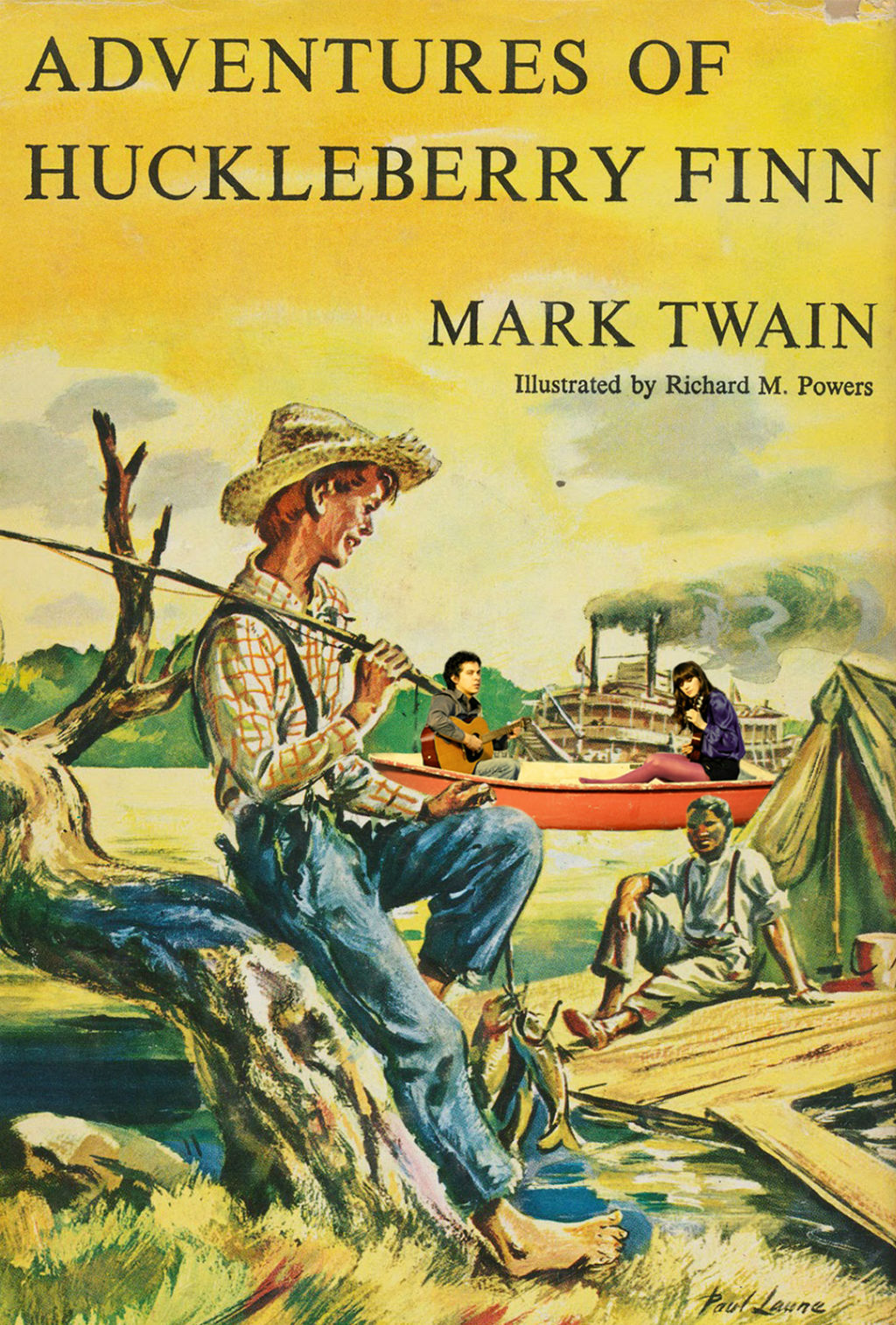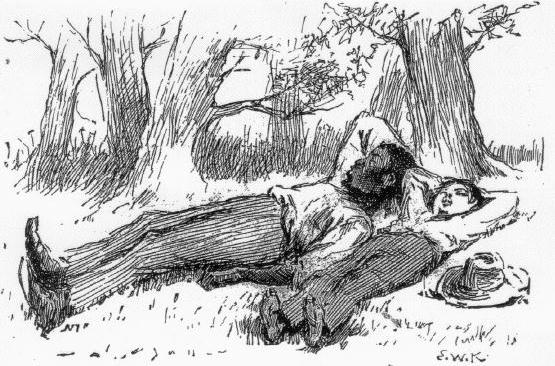Here we go again! This week, I’m discussing how I read The Adventures of Huckleberry Finn by Mark Twain in tenth grade. 
My class had to read this book for English towards the end of the year, and I was honestly tired of all of the books we had read up to this point because this was definitely one of the more reading-heavy English courses I’ve ever taken. The worst part was I felt like I wasn’t learning anything because my teacher NEVER got off of her chair. Instead, my classmates and I walked into class every day only to find a Google Classroom assignment about the reading waiting for us when we walked into the room.
Anyway, by this point in the year, I had practically stopped putting as much effort into the class, especially because I was so absorbed with studying for AP exams.
That being said, when the time came for the two-day test on this book, I was anything but prepared. Huck Finn is one of the two assigned novels throughout high school that I never finished.
In fact, I didn’t even finish the Sparknotes in time for the test. But, hey, at least I tried.
The night before, I tried to catch up on the reading; I genuinely did. The efforts weren’t fruitless, however. I still managed to gain understanding of the author’s purpose.
Twain’s novel takes place in a post-Civil War Southern setting in which Huckleberry Finn, a young white boy who is constantly taught how to behave in order to be “civilized,” fakes his own death to escape his abusive, drunken father.
On the other hand, Jim, a slave of Miss Watson, Huck’s adoptive mother (who took care of him until his biological father came back to town to declare custody over him), also escapes after he hears that Miss Watson considers selling him to another plantation-owner.
When they eventually run into each other, Huck and Jim decide to travel together as a pair as they attempt to remain undetected in their escape.
Through the well-written satire, Twain effectively demonstrates the hypocrisy behind slavery and the complex morals operating in the white-dominated South.
For example, as the whites take pride in being “civilized” and “morally-right,” the town judge still declares that Huck’s abusive father, Pap, has “rights” to Huck due to their biological relation, even though living with Pap is a threat to Huck’s well-being. Twain illustrates this specific example to mirror the improper ethics of having rights to control slaves as “property.” Throughout the novel, Huck encounters several white individuals who all turn out to have questionable morals, which generally turn out to have prejudiced roots.
Overall, the book was very interesting to read. (I might even try to finish it some time).
However, there was so much other homework that, in my opinion, was more important.
So, unsurprisingly, on the morning of Day 1 of my two-day test, I attempted to cram in the rest of the Sparknotes. Despite my efforts, I was trying so hard to actually comprehend the storyline that I knew I wasn’t going to finish in time. Instead, I had one of my friends tell me the remaining of the story.
I could barely retain what occurred during the third quarter of the book, particularly with the conmen who claimed to be dukes or whatever, but I am beyond thankful I remembered the part about Tom Sawyer’s bizarre plan to help Huck free Jim from his aunt and uncle, Silas and Sally Phelps, who had Jim held hostage.
To be honest, I don’t even remember why this was such a pivotal moment, but once Jim is freed, Tom gets shot in the leg, and Jim risks his freedom to go and make sure Tom is okay. (My guess is that this probably holds significance because it highlights Jim’s humanity, contradicting the objectifying image of black slaves).
 Why do I care about this part though? Because part one of my English test consisted of four free response questions about the novel, and I used this example to answer every. Single. Question.
Why do I care about this part though? Because part one of my English test consisted of four free response questions about the novel, and I used this example to answer every. Single. Question.
At this point in the year, I had become fairly skilled at bs-ing my assignments for the class, and that part of the book is exactly what got me an A on the test. Quite honestly, I didn’t deserve that high of a grade, but it was pleasing to see that I managed to make the most out of my situation.
That night, I finished the rest of the Sparknotes for Day 2 of the test. Needless to say, that part was a breeze once I comprehensively read a summary of what was going on in the novel. I chose not to finish the book again because there was still too much work to do in other classes, but everything worked out well in the end, so I had little regrets.
Anyhow, even though I didn’t finish the novel, Mark Twain’s Adventures of Huckleberry Finn proved to be a highly impressive novel. Since my English course related to AP U.S. History, we discussed the historical relevance of the novel. I always found it interesting that following its publication, many libraries viewed the novel as ignorant for its portrayal of Southern culture, so they banned the book, which brought more attention to the novel and increased its popularity. Through the controversy that Huck Finn sparked, Twain was able to effectively communicate his message, and he still does so today. Overall, I rate Huck Finn as a 7/10.
I had to read “The Adventures of Huckleberry Finn” as well except I had to do it over the summer going into my sophomore year. Considering I was spending my time going to the beach everyday, I think I only bothered to pick up the book once and it was just too long and boring to bother finishing. I didn’t understand why it was considered an American classic! My first week back at school I had to take a free response and multiple choice test on it as well but unfortunately I didn’t preform as well as you did! I learned my lesson from avoiding summer reading or any reading at all!
I must say that I never read the book myself, but always wanted to. I can definitely relate to the feeling of being to overwhelmed in studying for tests that doing other tasks at the moment seem to be unimportant, i’ve had my fair share of moments such as this high school as well. Over all I like your review! I like how honest you are with how much you have read, and that even though you never finished you’d still like to give it another try. I think my favorite line in this blog is “I chose not to finish the book again because there was still too much work to do in other classes, but everything worked out well in the end, so I had little regrets,” mostly because of your bluntness and humor! Thanks for the read!
I also read “The Adventure of Huckleberry Finn”, but my experience was as a summer reading book before my junior year. This book really surprised me, because I ended up really enjoying it! Although I don’t remember much of the story anymore,I do remember that it was very intriguing and engaging to me as a reader. For all of my summer reading books, I had placed post it notes throughout the novels to alert me of where I had to read to by the end of each day. Huck Finn was the one book where I actually read ahead of schedule, because I really wanted to know what happened! One of the saddest part of this experience, however, was that as the assignment related to this book could be completed after reading only a single chapter that happened during Huck and Jim’s river journey, most of my friends chose to instead Spark Note the book, leaving me alone in my appreciation. But I was left with the satisfaction of having actually read a classic book. I thought this one was worth the effort.
Yasmin, this was so interesting to read! I read Huck Finn in freshman year, and I hated it. I was an immature reader and was not capable of understanding the meaning of the big picture. It was hard for me to make connections and extract themes and follow motifs. I just didn’t enjoy reading it, but reading your summary of it makes me want to give it a second chance! Also, I remember that it was banned in some schools. It reminds me of how recently, a school in Mississippi decided to remove To Kill a Mockingbird from the English curriculum!! This absolutely astonished me, and I was incredulous because it’s one of my favorite book. The administrators of the Mississippi school claimed that it made students feel “uncomfortable.” Both Huck Finn and To Kill a Mockingbird, I think, are intended to make their audiences uncomfortable. They show life as it truly was, making no effort to hide the harsh prejudices of people in their times. I have a lot of respect for authors who reveal the hiding places of such evils in order to bring awareness to their audiences.
I had to read this book in tenth grade as well. With that said, I also never finished it. But I did go to class and listened intently to the teacher when our class would discuss it. The book, from what I remember, is, as you mentioned, satirical. I found that Twain’s message was very well developed and delivered. On the other hand, I absolutely hated the plot of this book. I didn’t even read it, but I was bored out of my mind just listening about in class. As far as you analysis goes, it is really well thought out. You definitely know your stuff regarding this book. I like that you decided to talk about this book, because it is a classic, and it has a great message. Keep it up.
I never actually was assigned to read this book, but I remember in middle school I picked it up a few times to try and read it but I never could get through it. It really sucks that your English class was so test heavy. I loved English in high school because we engaged in deep discussions and did a lot of critical thinking about what we read. I find that it is much easier to get through a book if you discuss it with others.